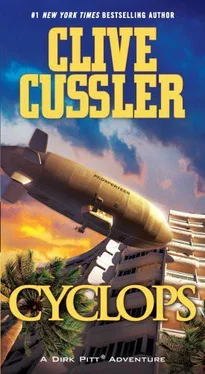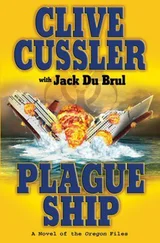Fifty steps and a minute later he crouched and crawled into an opening that led to a small shelf camouflaged by a large gray cloth perfectly matched to the surrounding surface. Another suited figure was lying on his stomach, gazing through the telescopic sight of a rifle.
Willie Shea, the colony's geophysicist, did not notice another presence until Steinmetz eased down beside him. "I don't think you made much of an impression," he said with a bare hint of a Boston twang. "The Slavs are about to attack the homestead."
From the elevated vantage point Steinmetz could clearly see Major Leuchenko and his men advancing across the valley. They came on like hunters stalking their prey, making no attempt to use the high ground of the crater's sides. The loose shale would have made the going too slow. Instead, they jumped across the flat ground in zigzag patterns, throwing themselves prone every thirty or forty feet, taking advantage of every boulder, every broken contour of the land. An expert marksman would have found the twisting and dodging figures nearly impossible to hit.
"Put a shot about ten feet in front of the point man," said Steinmetz. "I want to observe their reaction."
"If they're monitoring our frequency, we'll give away our every move," protested Shea.
"They haven't got time to hunt for our frequency. Shut up and shoot."
Shea shrugged inside his lunar suit, peered through the crosshairs of his scope, and squeezed off around. The gunshot was strangely silent because there was no air on the moon to carry the sound waves.
A puff of dust kicked up ahead of Leuchenko and he immediately dropped to the ground. His men followed suit and stared over the sights of their automatic weapons, waiting expectantly for more fire. But nothing happened.
"Did anyone see where it came from?" Leuchenko demanded.
The replies were negative.
"They're sighting for range," said Sergeant Ivan Ostrovski. A hardened veteran of the Afghanistan fighting, he could not believe he was actually in combat on the moon. He swept a pointed finger over the ground about two hundred meters ahead. "What do you make of those colored rocks, Major?"
For the first time Leuchenko spied several boulders scattered in a ragged line across the valley, stained with bright orange paint. "I doubt if it has anything to do with us," he said. "Probably put there for some sort of experiment."
"I think the fire came on a downward angle," said Petrov.
Leuchenko took the binoculars from his hip pack, set them on the tripod, and carefully scanned the side and rim of the crater. The sun was a blazing white but with no air to spread the light an astronaut standing in the shadows of a rock formation would be almost invisible.
"Nothing shows," he said finally.
"If they're waiting for us to close the gap, they must be conserving a small supply of ammunition."
"We'll know in another three hundred meters what kind of reception they've planned," muttered Leuchenko. "Once we come under cover of the greenhouses we'll be out of sight of the cave entrance." He rose to one knee and waved his arm forward. "Fan out and keep alert."
The five Soviet fighters leaped to their feet and scrambled on. As they reached the orange rocks another shot struck the fine sand in front of them and they flung themselves prone, a jagged line of white figures, face visors flashing in the intense rays of the sun.
Only a hundred meters separated them from the greenhouses, but nausea was draining their energy. They were as tough as any fighting men in the world, but they were combating space sickness in tandem with an alien environment. Leuchenko knew he could count on them to go far beyond their limits of endurance. But if they didn't force their way into the safe atmosphere of the colony within the next hour, there was little chance of them making it back to their landing craft before their life-support systems gave out. He gave them a minute to rest while he made another examination of the ground ahead.
Leuchenko was an old hand at sniffing out traps. He had come within a hair of being killed on three different patrols in ambushes laid by the Afghan rebels, and he had learned the fine art of scenting danger the hard way.
It wasn't what his eyes could see, it was what they couldn't see that rang a warning bell in his head. The two shots didn't fit a wild pattern. They struck him as deliberately placed. A crude warning? No, it had to mean something else, he speculated. A signal perhaps?
The confining pressure suit and helmet irritated him. He longed for his comfortable and efficient combat gear, but fully realizing they could not protect his body from the frying heat and the cosmic rays. For at least the fourth time the bile rose in his throat and he gagged as he forced himself to swallow it.
The situation was hellish, he thought angrily. Nothing was to his liking. His men were exposed in the open. He'd been given no intelligence on the Americans' weapons except the reported rocket launcher. Now they were under attack by small-arms fire. Leuchenko's only consolation was that the colonists seemed to be using a rifle or maybe even a pistol. If they possessed a full automatic firearm, they could have cut down the Soviets a hundred meters back. And the rocket launcher. Why hadn't they tried it before now? What were they waiting for?
What bothered him most was the total lack of movement by the colonists. The greenhouses, equipment, and small laboratory modules sitting around the entrance to the cave appeared deserted.
"Unless you see a target," he ordered, "hold your fire until we reach cover. Then we'll regroup and storm the main quarters inside the hill."
Leuchenko waited until each of his four men acknowledged and then he motioned them on.
Corporal Mikhail Yushchuk was about thirty meters behind and to one side of the man on his left. He stood and began running in a crouching position. He had taken only a few steps when he felt a stinging sensation in his kidney. Then the sudden thrust of pain was repeated. He reached around and grasped the small of his back just below his support system pack. His vision began to blur and his breath came in gasps as his pressurized suit began to leak. He sank to his knees and stared dumbly at his hand. The glove was drenched in blood that was already steaming and coagulating under the roasting heat from the sun.
Yushchuk tried to warn Leuchenko, but his voice failed. He crumbled into the gray dust, his eyes dimly recognizing a figure in a strange space suit standing over him with a knife. Then his world went black.
Steinmetz witnessed Yushchuk's death from his vantage point and issued a series of sharp commands into his helmet's transmitter. "Okay, Dawson, your man is ten feet left and eight feet ahead of you. Gallagher, he's twenty feet to your right and moving forward. Steady, steady, he's cutting right into Dawson. Okay, nail him."
He watched two of the colonists materialize as if by magic and attack one of the Soviets who was lagging slightly behind his comrades.
"Two down, three to go," Steinmetz muttered softly to himself.
"I've got my sights set on the point man," said Shea. "But I can't promise a clean hit unless he freezes for a second."
"Lay another shot, only closer this time to get them on the ground again. Then stay on him. If he gets wise, he could cut our guys down before they could close on him. Blast his ass if he so much as turns his head."
Shea silently aimed his M-14 and pulled off another shot, which struck less than three feet in front of the lead man's boots.
"Cooper! Snyder!" Steinmetz barked. "Your man is flat on the ground twenty feet ahead and to your left. Take him, now!" He paused to scan the position of the second remaining Russian. "Same goes for Russell and Perry, thirty feet directly in front. Go!"
Читать дальше












